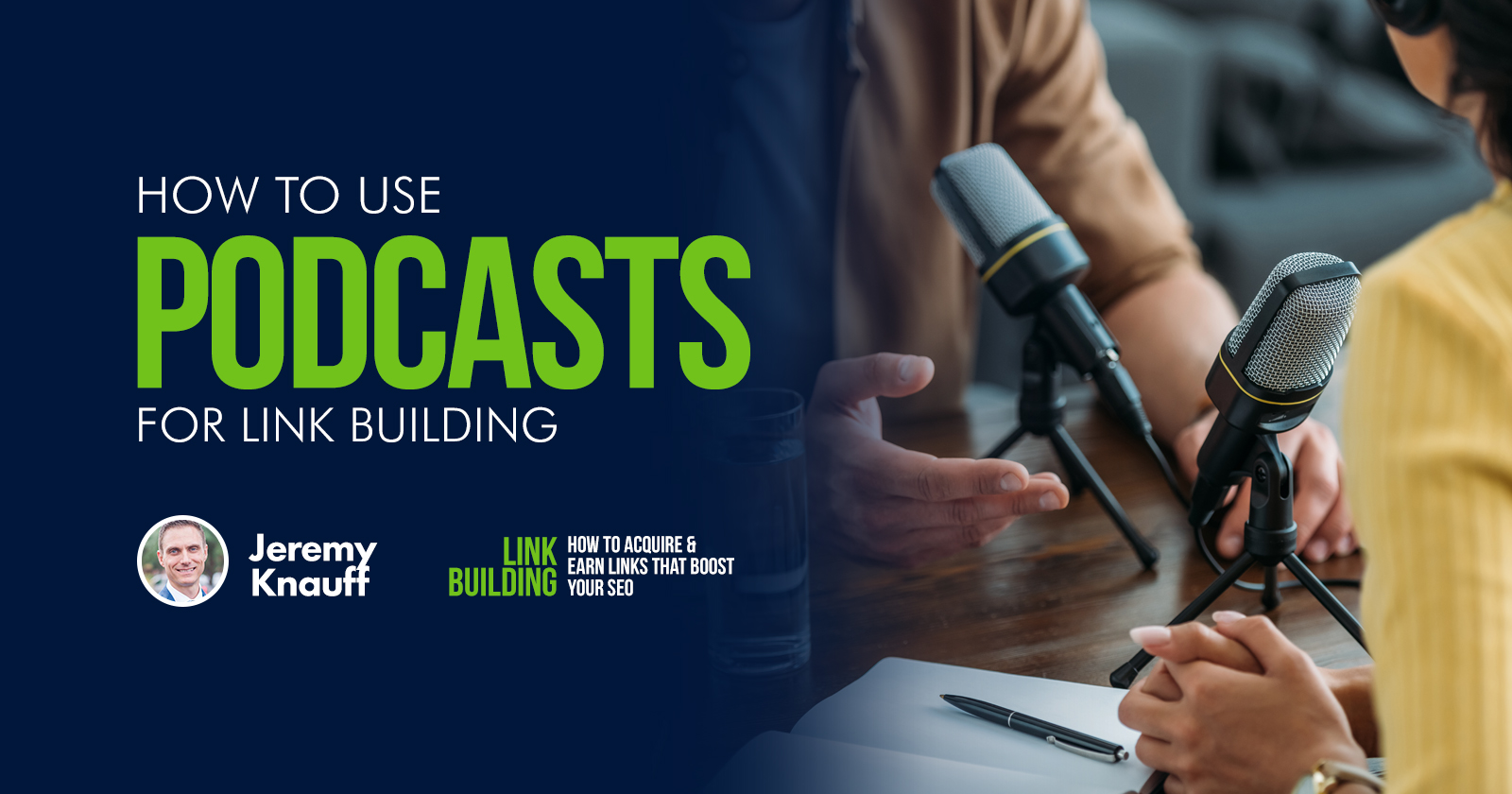Podcasts have gone from relative obscurity less than a decade ago to one of the fastest-growing marketing channels available today.
But the power of podcasts isn’t limited to reaching people who are listening.
When properly leveraged, podcasts can have a powerful impact on organic search, too.
There are two main reasons for this.
- Podcasts can drive people to search for a person’s or company’s name. This type of branded search can send positive signals to Google that can influence search suggestions, as well as improve ranking overall.
- Most podcasts are also available outside of aggregators like iTunes and Stitcher – most often, on someone’s website.
This typically leads to links in both directions.
The website hosting the podcast will usually link to their guest’s website from the post for that episode.
The guest, and in some cases, their fans, will link to that episode on the podcast website.
In other words, both having a podcast and being a guest on other podcasts can be an effective way to earn quality links.
Often, these links will also drive valuable referral traffic, too.
Hosting Your Own Podcast
Hosting a podcast is a great way to get your name out there while building a loyal audience.
It’s also a great way to develop meaningful relationships with people in your industry. I speak from first-hand experience.
I launched my podcast about a year ago and quickly realized that it made reaching out to strangers a lot easier and significantly more effective.
We aren’t going to get into how to launch a podcast. That goes far beyond the scope of this article, and frankly, even though I launched my own, I don’t consider myself an expert on the topic.
If you need guidance on that, I encourage you to check out John Lee Dumas’s guide to starting a podcast.
Our focus in this article will be on how to use your own podcast to earn high-quality links.
The first step, once you have all of the technical details sorted out, is to create something people actually want to listen to. This means sharing useful information, rather than blathering on about how awesome you are.
You might employ a monologue format, or as most people seem to do, it an interview format.
The choice is yours, but interviewing others is generally a more effective path to earning links.
It’s also a lot easier.
My very first podcast episode was a monologue.
It was just me talking about the importance of differentiating your company from competitors. The topic was useful, but I was alone in my office basically talking to myself – and I felt like a complete jackass.
On the other hand, interviewing someone or having a co-host makes it a lot easier and more natural. It’s just a conversation, rather than a weirdo alone in a room talking to themselves.
Some great examples of this format in our industry are:
- The Search Engine Journal Show, hosted by Brent Csutoras, Danny Goodwin, and Loren Baker
- Webcology, hosted by Dave Davies and Jim Hedger
- SEO 101, hosted by John Carcutt and Ross Dunn
Whichever format you choose, the key is to consistently put out original and valuable information.
From here, it’s a relatively simple matter of reaching out to people you’d like to interview. People who have something useful to say that other people want to hear.
In many cases, if you interview someone, they’ll link to their episode as soon as it goes live without any prompting. But you can avoid the uncertainty and simply ask them to do so.
A good time to do this is right after you’ve finished interviewing them, while they’re still on an emotional high.
Obviously they won’t be able to do so until it goes live, but you’ll have set the seed, making it more likely when the time comes.
You can also ask them to encourage their audience to link to it.
Be a Guest on Other Podcasts
Being a guest on other podcasts is a great way to create publicity for both for you and for your company, but it can also be a great way to earn links. That’s because most hosts will link to your website from the episode post.
Most podcasters who follow an interview format are always looking for interesting and knowledgeable guests. This means that if you have a particular skill set, unique knowledge, or an interesting opinion, it should be relatively easy to be a guest on relevant podcasts.
That’s assuming that you can pitch your story in a way that makes the host care what you have to say.
Popular podcasters typically receive a barrage of emails asking them to interview people. Many of those emails are ignored because they are purely self-serving.
The key here is to pitch from the perspective of their audience, rather than your own interests.
You need to figure out what their audience really cares about, and then send a pitch that explains why your story will appeal to them.
And while you’re at it, skip the fake compliments and fluff about how you happened to stumble across their podcast. Everyone knows the compliments are fake and they don’t care how you found their podcast.
Instead, just keep the pitch short and to the point.
And don’t waste your time with constant email follow-ups. If they’re interested, they’ll reply. The only thing you’ll accomplish by harassing them is making sure they never interview you.
And if you’re particularly aggressive, they might even tell other people, hurting your chances of getting on other podcasts.
If you have a large audience of your own, maybe from social media, a column at a large publication, or a podcast of your own, it may help to mention that, but don’t go overboard – a brief mention is enough.
When you ramble on endlessly about yourself, you’ll turn the host off and kill your chances of getting on the podcast.
Which Podcasts Should You Target?
It may be tempting to compile a list of podcasts, and sort their websites based on one of the myriads of SEO metrics.
Don’t.
While there may be some merit to targeting high-traffic websites, you’re far better off sorting them by relevance because the hosts will be more likely to interview you.
Beyond that, you may want to sort them based on engagement, which you can identify based on reviews and social media activity.
An added benefit is that their audiences will be more interested in what you have to say. This means they’ll be more likely to listen, click through, link to your website, and even buy your products or services.
Summary
Timeframe: This is a fairly simple and straightforward process – compile a list of relevant podcasts and pitch them on you (or your client) being a guest. This could take as little as an hour depending on the niche and how many podcasts you want to pitch. Some niches may have only a few
Results detected: You could begin earning links within a few weeks, but some podcasts are booked out months in advance, so it may take a lot longer. They may begin impacting ranking just as quickly, depending on the topics you want to rank for, and the authority and relevance of the websites the links are on, but in most cases, you should expect to see a lag time of several months.
Average links sent per month: This will depend entirely on how many podcasts are in your niche, and how many you can fit into your schedule. After all, there are only so many hours in the day and you can’t spend them all being interviewed on podcasts. Most niches will have at least a dozen or so podcasts, but certain niches, like business or digital marketing, could have hundreds.
Tools needed:
- Google or Bing
- Thick skin (You’ll probably be told “no” a lot.)
Benefits:
- This can be an effective way to earn the kind of high-quality, relevant links that can dramatically improve ranking. Often, these are links that your competitors may not have considered, giving you an advantage over them in search.
- Podcasts tend to have highly-engaged audiences, which means that these links are more likely to generate referral traffic.
- This tactic goes beyond SEO by creating positive publicity. And as more people hear about your brand, branded search will also increase, which can be a positive signal to Google.
Image Credits
Featured Image: Paulo Bobita





![AI Overviews: We Reverse-Engineered Them So You Don't Have To [+ What You Need To Do Next]](https://www.searchenginejournal.com/wp-content/uploads/2025/04/sidebar1x-455.png)